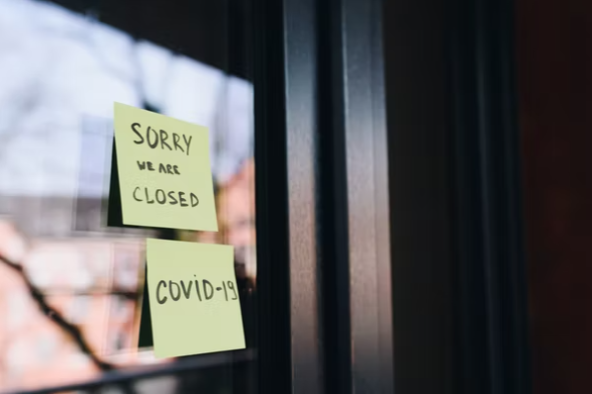Corbin – to appeal or not to appeal?
Policyholders have claimed victory in the case of Corbin and King Ltd v AXA Insurance UK Plc. Corbin and King Ltd pursued a claim for business interruption after it was forced by the COVID-19 pandemic to close its restaurants located around the UK. They based their claim on a non-damage Denial of Access (NDDA) clause which stated:
“access to your premises is restricted or hindered… arising directly from:
- the actions taken by the police or any other statutory body in response to a danger or disturbance at your premises or within a 1-mile radius of your premises.
- the unlawful occupation of your premises by third parties…”
Corbin and King Ltd argued that each case of COVID-19 was considered an equal cause of the government’s requirement for all premises to close as a result of the pandemic, and this did therefore restricted access to the premises. AXA Insurance UK Plc argued that the wider pandemic could not be a factor for closure of the premises.
The first instance judge held that the Supreme Court’s departure from the historical causation test meant that this case could be considered from a different viewpoint. She held that “COVID-19 was fully capable of being a danger within 1-mile of the insured’s premises… led to the regulations which caused the closure of the businesses and caused the business interruption loss.” Additionally, AXA was ordered to pay each policyholder £250,000 – their claims were not able to be aggregated within one policy limit of £250,000.
Whilst AXA was given the opportunity to appeal and had initially refused to pay the claimants a combined compensation of £4.36m, AXA has now reportedly confirmed that it will not be appealing the High Court’s decision. This is an important case for policyholders and insurer alike and could leave the doors open to many more successful claims under NDDA clauses.
Furlough decision – June 2022
The UK Courts will soon be deliberating the issue of furlough payments and whether or not such payments should be deducted from any compensation afforded to policyholders. The case in question is Stonegate v MS Amlin & Ors.
Stonegate owns over 4,500 hospitality businesses across the UK and sustained substantial losses as a result of the COVID-19 pandemic and government closures. Coverage has been accepted by insurers, but the issue is that of quantum including (i) aggregation; (ii) post policy period losses; (iii) additional increased costs of working and (iv) government support. To date, insurers have been arguing that any government assistance whether that be in the form of furlough payments, grants or business rates relief are to be deducted from any compensation awarded.
The case of Stonegate will hopefully provide some finality over this issue when it is decided in June.
Australia Test Case No. 2
The Federal Court of Australia has found in favour of insurers as it heard the appeal in the case of LCA Marrickville Pty Limited v Swiss Re International SE. At first instance there had been 10 proceedings. In nine of these cases, the judge held that the insuring clause for business interruption was not engaged by way of Covid-19 related losses. Five were appealed.
In the case of Meridian Travel, it was held that the disease extension did apply but it could not be agreed that the business was interrupted as a result of a disease within 20km of the premises. This was also considered on appeal.
The Federal Court upheld the decisions given at first instance by Jagot J in all 5 proceedings. However, the Federal Court did differ from the first instance decision in one important area – government grants. Jagot J held that where indemnity was met, any third party payments such as JobKeeper should be taken into account when calculating compensation to be provided pursuant to the policy indemnity. The Federal Court decided that this was not the case as those government payments do not satisfy the definition of “Sum Saved” within the policies.
The Federal Court also held that interest by way of the Insurance Act 1984 (Cth), claimants were entitled to interest as a result of any delay in payment of indemnity, from the date payment should have been made. It held that where a genuine dispute as to liability arises, does not mean that an insurer is not unreasonably withholding payment of a claim and therefore not liable to pay interest on the amount awarded.
Special leave for this to be appealed to the High Court of Australia has been granted.
Louisiana panel to hear appeal from 1st COVID-19 trial
The first US COVID-19 trial is to be heard this month before a Louisiana appeals court. The claimant is a New Orleans restaurateur, Cajun Conti LLC, who was the first policyholder to issue proceedings and later go to a bench trial in 2020. At first instance, the judge ruled in favour of the insurers citing that coverage was not met.
It is argued that Louisiana state law was incorrectly applied to the case and that judge at first instance incorrectly found that COVID-19 did not cause direct physical loss or damage to the premises. It argues that records indicate that the presence of the virus rendered the premises up to 100% unusable.
In making this assertion, Cajun Conti LLC refers to the case of Widder v Louisiana Citizens Prop. Ins. Corp which found that dust led to a direct physical loss of property. Cajun Conti LLC state that this “…case made clear that the presence of the lead dust damaged people and its presence therefore rendered the property uninhabitable…”. It will also be argued that the lack of a Covid-19 exclusion clause makes the policy ambiguous.
The defendant in the case, Lloyds of London Syndicates, stated that the lack of a COVID-19 or virus exclusion is not relevant where the policy is not triggered due to liability. It referred to hundreds of other decisions against policyholders where there was no such exclusion.
This case will be significant to many other Louisiana policyholders. Already, another claimant, Q Clothier, has asked that its own appeal by reheard by the Fifth Circuit pending the decision in Cajun Conti LLC. Many other claimants may well be waiting in the wings. However, to date, those COVID-19 cases already heard in the US have been held in favour of the insurers. It will certainly be an uphill battle for policyholders with half of all claims against insurers for COVID-19 related business interruption losses having already been thrown out by the courts.
Checking your policy
Whatever sector you operate in, if your business has been affected by the pandemic, it’s worth checking your insurance policy. At Capital Law, we’ve been helping over a hundred businesses by reviewing their policies for free. You can send us yours via this short form, or get it touch at c.povey@capitallaw.co.uk if you have any questions.



